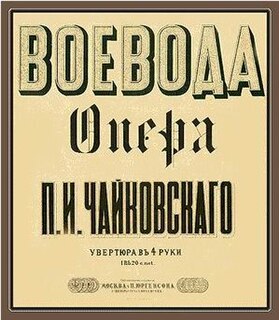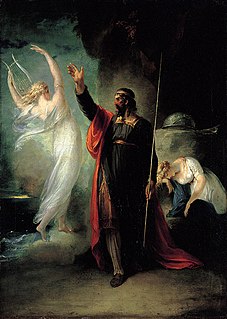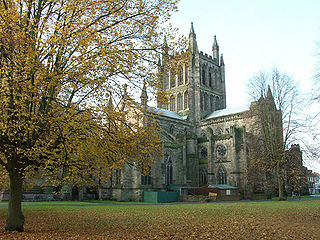
Joseph Maurice Ravel was a French composer, pianist and conductor. He is often associated with impressionism along with his elder contemporary Claude Debussy, although both composers rejected the term. In the 1920s and 1930s Ravel was internationally regarded as France's greatest living composer.

Ralph Vaughan Williams, was an English composer. His works include operas, ballets, chamber music, secular and religious vocal pieces and orchestral compositions including nine symphonies, written over sixty years. Strongly influenced by Tudor music and English folk-song, his output marked a decisive break in British music from its German-dominated style of the 19th century.
Entr'acte means "between the acts". It can mean a pause between two parts of a stage production, synonymous to an intermission, but it more often indicates a piece of music performed between acts of a theatrical production.

Jacques François Antoine Marie Ibert was a French composer of classical music. Having studied music from an early age, he studied at the Paris Conservatoire and won its top prize, the Prix de Rome at his first attempt, despite studies interrupted by his service in World War I.

Fantasia on a Theme by Thomas Tallis, also known as the Tallis Fantasia, is a one-movement work for string orchestra by Ralph Vaughan Williams. The theme is by the 16th-century English composer Thomas Tallis. The Fantasia was first performed at Gloucester Cathedral as part of the 1910 Three Choirs Festival, and has entered the orchestral repertoire, with frequent concert performances and recordings by conductors and orchestras of various countries.

Franz Schubert's Symphony No. 8 in B minor, D. 759, commonly known as the Unfinished Symphony, is a musical composition that Schubert started in 1822 but left with only two movements—though he lived for another six years. A scherzo, nearly completed in piano score but with only two pages orchestrated, also survives.
Serenade to Music is a work by Ralph Vaughan Williams for 16 vocal soloists and orchestra, composed in 1938. The text is an adaptation of the discussion about music and the music of the spheres in Act V, Scene 1 of The Merchant of Venice by William Shakespeare. Vaughan Williams later arranged the piece into versions for chorus and orchestra and for solo violin and orchestra. It is approximately 13 minutes in duration.
Furniture music, or in French musique d’ameublement, is background music originally played by live performers. The term was coined by Erik Satie in 1917.
English Folk Song Suite is one of English composer Ralph Vaughan Williams' most famous works. It was first published for the military band as Folk Song Suite and its premiere was given at Kneller Hall on 4 July 1923, conducted by Lt Hector Adkins. The piece was then arranged for full orchestra in 1924 by Vaughan Williams' student Gordon Jacob and published as English Folk Song Suite. The piece was later arranged for British-style brass band in 1956 by Frank Wright and published as English Folk Songs Suite. All three versions were published by Boosey & Hawkes; note the use of three different titles for the three different versions.

Karelia Suite, Op. 11 is a subset of pieces from the longer Karelia Music written by Jean Sibelius in 1893 for the Viipuri Students' Association and premiered, with Sibelius conducting, at the Imperial Alexander University in Helsinki, Grand Duchy of Finland, on 23 November of that year. Sibelius first conducted the shorter Suite ten days later; it remains one of his most popular works.

The Voyevoda, Op. 3, is an opera in 3 acts and 4 scenes, by Pyotr Ilyich Tchaikovsky with a libretto written by Alexander Ostrovsky and based on his play The Voyevoda .

Pelléas et Mélisande, Op. 80 is a suite derived from incidental music by Gabriel Fauré for Maurice Maeterlinck's play of the same name. He was the first of four leading composers to write music inspired by Maeterlinck's drama. Debussy, Schoenberg and Sibelius followed in the first decade of the 20th century.

Rosamunde, Fürstin von Zypern is a play by Helmina von Chézy, which is primarily remembered for the incidental music which Franz Schubert composed for it. Music and play premiered in Vienna's Theater an der Wien on 20 December 1823.

The Tempest incidental music, Op. 1, is a set of movements for Shakespeare's play composed by Arthur Sullivan in 1861 and expanded in 1862. This was Sullivan's first major composition, and its success quickly brought him to the attention of the musical establishment in England.
Sea Songs is an arrangement of three British sea-songs by the English composer Ralph Vaughan Williams. It is based on the songs "Princess Royal", "Admiral Benbow" and "Portsmouth". The work is a march of roughly four minutes duration. It follows a ternary structure, with opening material based on "Princess Royal" and "Admiral Benbow", with "Portsmouth" forming the central section before a return to the opening material featuring the first two songs.

Chout, Op. 21, is the usual English-language title of a ballet by Sergei Prokofiev, written in two versions between 1915 and 1921. It is sometimes known as "The Tale of the Buffoon", or simply "The Buffoon". There also exists a symphonic suite from the ballet, Op. 21 bis, which is much more often performed than the full ballet score.

Fantasia on Christmas Carols is a 1912 work for baritone, chorus, and orchestra by the English composer Ralph Vaughan Williams.

The Carmen Suites are two suites of orchestral music drawn from the music of Georges Bizet's 1875 opera Carmen and compiled posthumously by his friend Ernest Guiraud. They adhere very closely to Bizet's orchestration. However the order of the musical allusions are in reversed chronological order, and do not adhere to the operatic versions entirely, although the Suite is directly inspired by Bizet's opera.

The Shylock Suite, Op. 57 is a six-movement work by Gabriel Fauré, first performed in 1890. In addition to four purely orchestral movements it includes two serenades for solo tenor with orchestral accompaniment. The composer constructed the suite from incidental music he had written the previous year for Edmond Haraucourt's play Shylock, an adaptation of Shakespeare's The Merchant of Venice, presented at the Théâtre de l'Odéon in Paris. The theatre music had been written for a small orchestra, and Fauré greatly expanded the orchestration for the concert suite.













